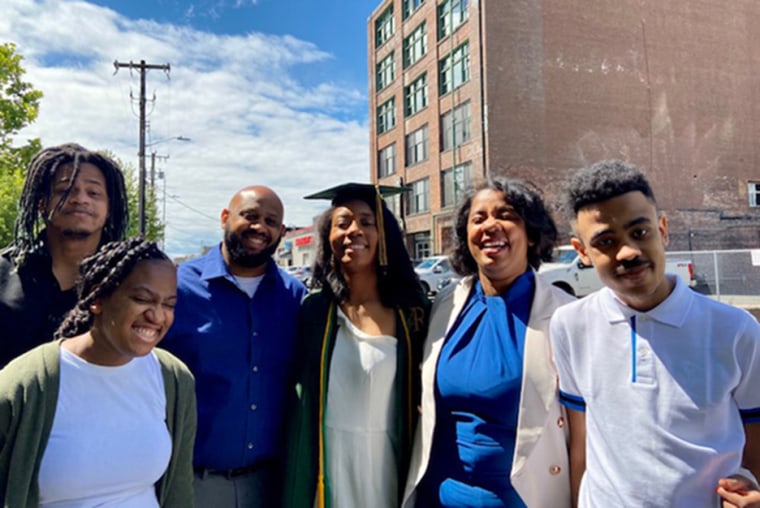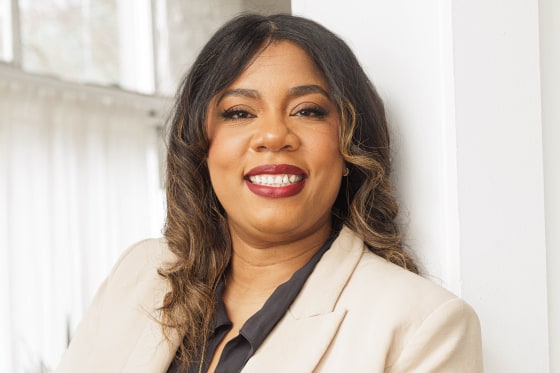In the late summer of 2020, while all eyes were on the Covid-19 pandemic, I was diagnosed with multiple sclerosis (MS), an incurable disease that affects the central nervous system.
It’s an autoimmune disorder that causes symptoms from severe fatigue, to weakness, difficulty walking, pain and more. MS can impact nearly anywhere your nervous system touches and is often called the snowflake disease because each case is different.
When I was diagnosed, I became one of the 60 percent of Americans who manage a chronic illness, 1 in 10 who have an autoimmune disorder, of which 80 percent of them are women, and one of the growing number of Black Americans with this disease.
At the time of diagnosis, I was also an early business owner, wife, and mother of four children who had left my corporate role with one of the largest companies in the world to build a consultancy that I believed would transform how we work.
The overwhelming fear — and relief — of a diagnosis
Prior to my diagnosis, I experienced a slew of symptoms over the span of a year and a half that took me from my primary doctor, to specialists, and back to my primary doctor in unrelenting circles.
My primary doctor explained that my severe eye pain was inflammation due to straining on my laptop and that my severe leg pain was from sitting too much. But she couldn’t quite explain my other symptoms, so she referred me to a cardiologist due to pain in my chest, arm, and neck. I often had spasms where I often thought I was having a heart attack. I went to a pulmonologist due to feeling winded, and then went back to my primary doctor again when I began to experience vertigo and heart acceleration.
This back and forth continued for months with no answers. Eventually, when the tests they gave me came back negative, I accepted what each doctor told me: that I was stressed and “overworking.”
But in the winter of 2019 things got worse. I started to feel faint nearly all the time. I would walk across the kitchen and have to grab on to the refrigerator or the little wooden island in the center. I remember taking our son to a gymnastics class and while watching from the parents’ room I ran outside, standing in the cold, trying to determine why I felt like I was dying and wondering if I should call 911. Eventually, I decided against it so I wouldn’t embarrass myself but went to the ER later that night. Between December and the start of the Covid-19 pandemic I went to the ER several times.
A few weeks later as my family headed out to a holiday event, I stood in the kitchen crying, telling them I couldn’t go because I was terrified I would pass out. I started to feel sad and sullen. I eventually started having panic attacks. Although I was terrified to go to the hospital, I went at least five more times during the pandemic.
In August of 2020, I again started to feel strange. I went to the mirror and noticed that my face and mouth were drooping on one side — I pulled my husband aside and told him we needed to go to the ER yet again. “I think I’m having a stroke,” I remember saying. As we drove the 12 minutes to the emergency room from our house I kept thinking, I’m going to die. I started telling my husband all the things you say when you think your life is ending — take care of the kids, I love them, I love you.
This time I was admitted to the hospital. A day later a doctor came into my room and said you have a disease called multiple sclerosis. I felt two things — overwhelming fear and relief.
In many ways, I was lucky I had a symptom flare so significant I was able to get diagnosed. According to research, the average length of time for diagnosis with an autoimmune disease is 4.5 years. Many go much longer without a diagnosis. They are gaslighted by the doctors and specialists who are supposed to care for them — and as a result, if they are anything like me — they gaslight themselves.
In other ways, it means that I am sicker than I would have been if I was diagnosed earlier. I remember hearing a presentation on MS where the doctor said, unfortunately when many people get diagnosed with MS it is the sickest they have ever been. Because I felt so much worse after my diagnosis, I strangely found comfort in that.
Embracing a new way
So, what do you do when you learn that you will be sick forever?
This is after you have fought your way through a childhood of instability and trauma to create a life of stability and normalcy. This is after you became the first person in your family to go to college?

What do you do when you are a married mother of four children? And when you are looking to build a company that you hoped would change the lives of your family and have a major impact on the world?
You mourn, you learn, and then you find your way forward.
My first year after the diagnosis I spent the majority of my time in denial. I tried to prove to myself and to others that I could keep everything in my life exactly the same. I overworked to my body’s limit and finished nearly every day in pain, with difficulty walking. But I continued on, I didn’t want to allow this disease to take everything that I had built and the future I imagined for myself and my family. I truly believed that I was here to overcome generational trauma. So, I continued, I took the medications prescribed and put my head down to get back to it.
Until I couldn’t. I found myself contacting my neurologist more and more often. I couldn’t understand why I felt terrible if there were no new lesions. I was taking one of the most effective medications available.
I eventually changed neurologists and found someone who was open to different perspectives. In my experience, this is rare, especially in neurology. A couple of appointments in, I had a conversation with her that changed my perspective on everything.
She sat me down and explained: “I have clients who work in all industries, some are lawyers, some are doctors — you all have something in common — they are all ambitious like you,” she said. “Eventually, I have to tell all of these ambitious people that you cannot work in the same ways that you used to. That time has passed for you, you have to embrace a new way.”
I took this news as hard as the news of my diagnosis. I remember walking out of the office and feeling nothing. I went to my car and cried for 30 minutes. As a social worker and a coach, I know that you never ask why me — because why not you?
But I acutely felt that all the difficulties in my life had led me to this point — after all, trauma adds up and up. This conversation was healing for me, it allowed me the opportunity to feel everything. To truly understand and mourn what I had lost. Both in the diagnosis of this disease and before it.

For a while, I took the steps to wind things way down. Then I restructured the company and looked for ways to be more collaborative and build more relationship. The biggest organizational change I made was to bring on a business partner and engage external consultants where there was synergy. I made changes to the services we offer and expanded our team.
My goal at that time was to really learn the disease and learn how my body responded to it. After another two years, I began to deeply understand how to work with my illness — intellectually and intuitively. This process helped me to cultivate three beliefs that guide my approach for living my best life:
The right information and support is critical, and it can save your life
After I was diagnosed, I began to build my knowledge and learn as much as I could about MS and about chronic illness overall. I joined Reddit boards and Facebook groups dedicated to women of color who live with the disease. There are excellent neurologists I follow on YouTube who believe in research and help me understand the nuances of this illness.
When my previous healthcare team was antagonistic and made me feel small by questioning my experience with the disease, I was able to work with a patient advocate to help me identify a new neurologist and get the additional testing I needed. This behavior is unacceptable and it harms and kills women and Black women every day. It was this knowledge that helped me when my youngest child became sick and was eventually diagnosed with a severe chronic condition.
Always trust your intuition
Before I was diagnosed, I knew something was wrong. I could feel it in every part of my body. And I tried to advocate for myself when I was told it was only depression, or stress, or “working too much.” I would leave the doctor’s office or ER feeling beat-down and defeated. My family has always been supportive but some of them also questioned if maybe something else was going on. Eventually, I convinced myself it was just …. something else.
When I was finally diagnosed, I felt fear, relief, and another symptom: shame. I was ashamed that I had let myself down and failed to believe in me. Now I feel more solid in trusting my intuition, but I still have to work at it.
Managing your energy is priority
Intuitively, I learned to notice the ebbs and flow in my body and my energy. I discovered spoon theory — a metaphor for energy management used in chronically ill and disabled communities — a year or so after I was diagnosed. It helped me to begin to make sense of why I could drive one day and feel too exhausted to drive the next day. Now I’ve learned to manage my energy and spend it wisely. For example, I can work out 5 days a week for 10 minutes, instead of 3 to 4 days a week for 20 minutes.
I can also feel when symptoms are coming on and respond immediately. I work really hard to reduce stress. For me, stress is the number one driver of severe symptoms. While overworking will bring on pain and discomfort, it is stress that brings the worse symptoms.
I have built practices to manage my stress, like doing tai chi and using acupuncture.
While the truth remains that I can’t guarantee how things will end up, I now know that the version of me who is ambitious and wants to make an impact on others and the world is still here — and she is ready to continue the journey.
